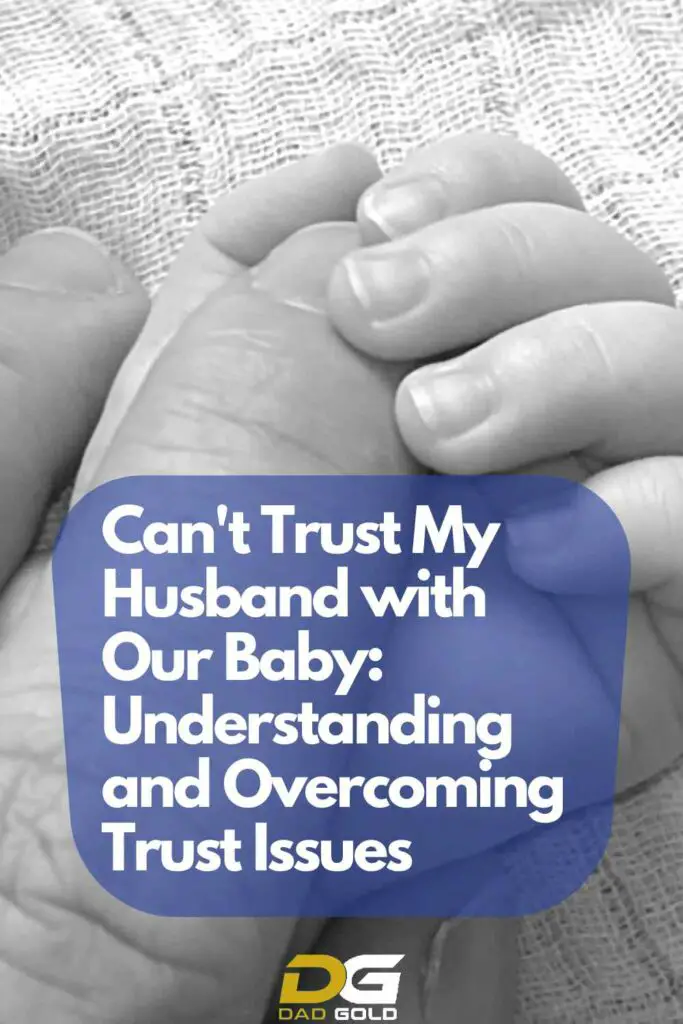Becoming a new parent can be one of the most exciting and life-changing experiences a person can have.
But with the arrival of a new baby also comes a host of new responsibilities and emotions.
For new mothers, the pressure to be the primary caretaker and the uncertainty of leaving their baby with someone else can lead to feelings of insecurity and mistrust.
If you’re a new mom struggling with trust issues regarding your partner and baby, you’re not alone.
In this article, we will explore the common feelings and emotions that new mothers may experience and offer practical tips and solutions to help you navigate this new territory and build trust with your partner as a new parent.
A quick note: If you lack trust because you fear for your child’s safety, seek professional help.

Relationship Trust Issues

When it comes to trust in relationships, it’s like a delicate dance between two partners. Both have to be in sync, moving together in harmony, and both must trust each other, not step on each other’s toes.
But what happens when a new little bundle of joy enters the scene?
-

Bold Male Pride – Baseball Trucker Cap Celebrating Masculinity
£18.00 Select options This product has multiple variants. The options may be chosen on the product page -

Dad Bod Appreciation Gift Mug
£14.00 Add to cart -

Dad Bod, Bad Jokes Structured Baseball Cap
£22.00 Select options This product has multiple variants. The options may be chosen on the product page
Well, it’s like trying to dance with a third partner who’s not quite sure what they’re doing yet. It can be chaotic and confusing, but with patience and understanding, it’s still possible to create a beautiful dance.
Now, for the new mom, it’s like she’s been thrown into this dance without prior training. Suddenly, she’s got this little human being utterly dependent on her, and she’s expected to know all the steps and lead the dance.
It’s no wonder she might feel a little apprehensive about letting her partner join in, especially regarding the care of their baby. She may feel like she’s the only one who can do it right or that her partner might accidentally drop the baby or something. It’s natural; this feeling of insecurity can lead to trust issues.
And it’s not just about the baby. New mothers may also experience postpartum depression, anxiety, and hormonal changes that can affect their emotions and ability to trust their partner. These feelings, coupled with the immense responsibility of caring for a new baby, can make it difficult for new mothers to trust their partners with their little one.
But here’s the thing, trust is not built overnight. It takes time and effort from both partners. The key is for both partners to understand the new mom’s feelings and work together to find ways to alleviate them.
Open and honest communication is also crucial, as it allows couples to understand where the other is coming from and find solutions together. Giving the new father a chance to bond with the baby can also help to build trust.
The more involved the father is in caring for the baby; the more trust will build in the mother’s mind.
Understand the Root of the Trust Issues

When it comes to trust issues, it can be a bit like trying to solve a mystery. You know something’s not quite right, but you’re not sure what it is.
So, let’s imagine for a moment that you’re a new mom, and you’ve got this nagging feeling that you can’t trust your partner with your little bundle of joy. The first step in understanding the root cause of your trust issues is to ask yourself, “why am I feeling this way?”
The answer may be that history with your husband has taught you that he is not responsible enough to look after your baby. That will be a very challenging issue and may require professional help.
I mentioned a tricky subject above, postpartum depression. If you think this may be why you do not trust your husband with your baby, it is also time to seek professional help. Please reach out to someone close to you.
It is also natural to feel like you are the sole carer for your baby. Hormonal changes are designed to make moms feel that way.
Let’s not forget the overwhelming responsibility of being a new parent. It can be an intense experience, making it hard to trust anyone, including your partner. It can be hard to trust your partner with your little one when you feel like you’re the only one who can do it right.
Communication is Vital

Regarding trust issues, communication is like a magic wand that can resolve many feelings.
But why is communication so important when it comes to resolving trust issues?
Well, it allows you to express your feelings and concerns without feeling judged or dismissed.
When you can open up and talk about what’s on your mind, it can be very liberating. And when your partner is also willing to listen and understand your perspective, it can create a sense of connection and intimacy that can be difficult to achieve when trust issues are present.
Communication also helps to clear up any misunderstandings. Sometimes, trust issues can stem from a simple miscommunication. For example, maybe you felt hurt when your partner didn’t follow through on a promise and didn’t realize they had hurt you. But when you both talk openly and honestly, you can clear up any misconceptions and find ways to avoid similar situations in the future.
Another important aspect of communication is that it helps you to understand your partner’s perspective. When you listen to your partner, and they listen to you, you can gain a deeper understanding of where they’re coming from and why they might be behaving the way they are.
This can be especially important when it comes to trust issues, as it can help reduce anger or resentment.
Talk to each other!
Empower Your Husband to Bond With His Baby

When bonding with a new baby, it’s easy for dads to feel like the “sidekick” in the superhero story. Moms are often seen as the natural caretakers, and dads can feel like they’re just along for the ride.
It is vital for dad to build a strong bond with his new baby! It will help mom out too.
So, how can we empower dads to bond with their new little ones? Well, first things first, it’s important to remember that dads are just as capable of bonding with the baby as moms are. They may not have carried the baby for nine months, and they will not have had the hormones that give the upper hand, but they still can love and care for their child just as much.
I know this for a fact!
One way to empower dads is to give them specific tasks and responsibilities. Dads can feel more involved with specific roles and responsibilities, such as diaper duty or bedtime routine. This not only provides the dad with a chance to bond with his baby but also shows the mom that she can trust dad with the baby.
It is a win-win!
Another way to empower dads is to give them opportunities to be alone with the baby. Encourage dads to take the baby out for a walk or do a solo feeding, so they can have one-on-one time with their little one. This can be a great bonding experience for both dad and baby.
If you are unsure about leaving your baby alone with your husband, send him around a friend’s house, so he has a little help if needed.
Just ensure your husband gets to spend time with his baby!
It’s also important to remember that dads may bond with the baby differently than moms. Dads do things differently.
Some dads may be more hands-on and physical, while others may be more emotional and nurturing. Awareness of these differences and allowing dads to bond in their way can help them feel more comfortable and confident in their role as a parent.
Finally, dads should be encouraged and celebrated in their parenting roles. Recognizing and acknowledging when they are doing a good job and reminding them they are valued and appreciated helps to boost their confidence and make them feel more comfortable in their new role.
Offer Coaching

If the way your husband helps with the baby leaves you unsure, take some time to offer advice and guidance.
Show him how to change diapers, hold, feed, and burp your baby. Offer guidance on what to do when the baby falls asleep. Make sure he is paying attention too!
Do not assume he already knows all of this stuff, although it should have been taken care of when preparing for fatherhood!
Make sure he is fully aware of how he should care for his baby in a way you are happy with. Do not give him a hard time if he gets something wrong. Instead, offer guidance.
Seeking Professional Help

It’s essential to seek professional help to diagnose the problem’s root cause and find solutions.
Different types of professionals can help with trust issues. A therapist or counselor can be a great resource. They can help create a safe space where you can explore your feelings and thoughts and find ways to resolve the trust issues you’re experiencing.
One approach to consider is couples therapy, as trust issues can be a concern that affects both partners. A therapist can help to facilitate open and honest communication between you and help you find solutions that work for both of you.
A postpartum specialist or counselor can also benefit new mothers experiencing trust issues. They are specially trained to work with new moms and can provide support and guidance to address any postpartum-related issues contributing to trust issues.
It’s also important to remember that trust issues can be signs of deeper relationship problems. A therapist or counselor can help you to identify the underlying issues and provide guidance on how to address them.
Conclusion
Trust is an essential part of any relationship, especially when it comes to new parents.
The arrival of a new baby can bring a host of new emotions and responsibilities, which can strain even the strongest of relationships. Trust issues can be challenging to overcome, but open and honest communication, patience, and understanding can build a stronger and healthier relationship with your partner.
Remember to also take care of yourself and seek professional help if needed.
One of the key takeaways is understanding the root cause of the trust issues, whether it’s a history of trust issues, postpartum depression or anxiety, hormonal changes, or simply the overwhelming responsibility of being a new parent. By identifying the cause, you can then address the problem and work towards resolving it.
Another takeaway is the importance of communication. It allows you and your partner to express your feelings and concerns and work together to find solutions.
Encouraging the father to bond with the baby and providing him with specific tasks and responsibilities can also help to build trust. A more involved dad automatically builds trust!
Lastly, don’t be afraid to seek professional help. A therapist or counselor can be a valuable resource, providing a safe space to explore your feelings and thoughts and helping you find ways to resolve the trust issues you’re experiencing.
Building trust with your partner as a new parent can be challenging, but with patience, understanding, and willingness to communicate, work together and seek professional help when needed.
Good luck!




